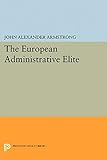The European administrative eliteby] John A. Armstrong.
Material type: TextSeries: Publication details: [Princeton, N.J. Princeton University Press 1973.Description: 1 online resource (xii, 406 pages) illustrationsContent type:
TextSeries: Publication details: [Princeton, N.J. Princeton University Press 1973.Description: 1 online resource (xii, 406 pages) illustrationsContent type: - text
- computer
- computer
- online resource
- online resource
- 9781400867059
- JF1411 .E976 1973
- COPYRIGHT NOT covered - Click this link to request copyright permission: https://lib.ciu.edu/copyright-request-form
- digitized 2011 HathiTrust Digital Library committed to preserve
| Item type | Current library | Collection | Call number | URL | Status | Barcode | |
|---|---|---|---|---|---|---|---|
 Online Book (LOGIN USING YOUR MY CIU LOGIN AND PASSWORD)
Online Book (LOGIN USING YOUR MY CIU LOGIN AND PASSWORD)
|
G. Allen Fleece Library ONLINE | Non-fiction | JF1411 (Browse shelf(Opens below)) | Link to resource | Available | ocn767556758 |
Includes bibliographies and index.
COPYRIGHT NOT covered - Click this link to request copyright permission:
https://lib.ciu.edu/copyright-request-form
Master and use copy. Digital master created according to Benchmark for Faithful Digital Reproductions of Monographs and Serials, Version 1. Digital Library Federation, December 2002. MiAaHDL
http://purl.oclc.org/DLF/benchrepro0212
digitized 2011 HathiTrust Digital Library committed to preserve pda MiAaHDL
Frontmatter -- Acknowledgments -- Contents -- List of Figures and Tables -- ONE. The Problem and the Analysis -- Two. The Comparative Method -- THREE. Diffusion of Development Doctrines -- FOUR. Recruitment and Class Role Models -- FIVE. The Family and Socialization -- Six. The Structured Adolescent Peer Group -- SEVEN. The Classics Barrier -- EIGHT. Higher Education as Ideology -- NINE. Alternatives in Higher Education -- TEN. Induction to Higher Administration -- ELEVEN. Career Patterns and Prospects -- TWELVE. Territorial Direction and Development Initiative -- THIRTEEN. Response to Challenge -- FOURTEEN. Implications of Development Interventionist Role Definition -- APPENDIX. On Quantitative Data -- Bibliography -- Index
Although there have been other studies of elite administrators in France, Great Britain, Germany, and Russia, John Armstrong has made the first systematic comparison of their roles, especially their inclination to participate in economic development. Drawing on role theory and theories of socialization and recruitment, he analyzes the influences that family, secondary school, specialized university instruction, and in-service experiences have had on administrators. Currents of ideas, class concepts of appropriate role behavior, and organizational peculiarities are also examined as possible influences. By exploring this subject over a long period-in some cases reaching as far back as the seventeenth century-this book shows how changing definitions of administrators' roles reflect their position in society and permit the exploration of changing socialization processes. The long time span also shows how factors such as administrative intervention can change from being marginally important to crucial in affecting economic growth. From the diverse European experience the author distills five factors which he hypothesizes have exerted a constant positive influence on administrative intervention in economic development, and suggests how these factors might be applied in analysis of other societies. He also provides a wealth of statistical data and an extensive bibliography. Originally published in 1973. The Princeton Legacy Library uses the latest print-on-demand technology to again make available previously out-of-print books from the distinguished backlist of Princeton University Press. These editions preserve the original texts of these important books while presenting them in durable paperback and hardcover editions. The goal of the Princeton Legacy Library is to vastly increase access to the rich scholarly heritage found in the thousands of books published by Princeton University Press since its founding in 1905.
There are no comments on this title.
